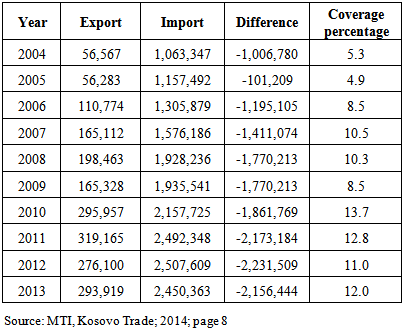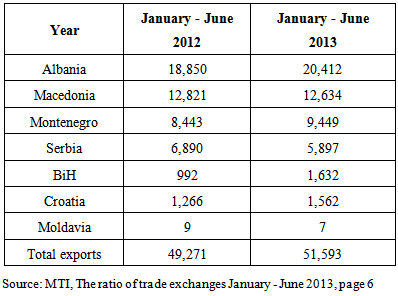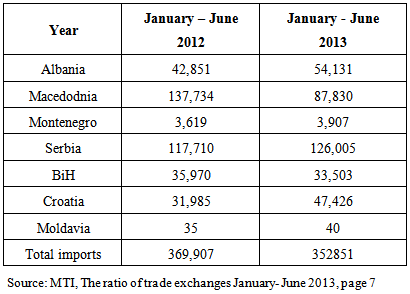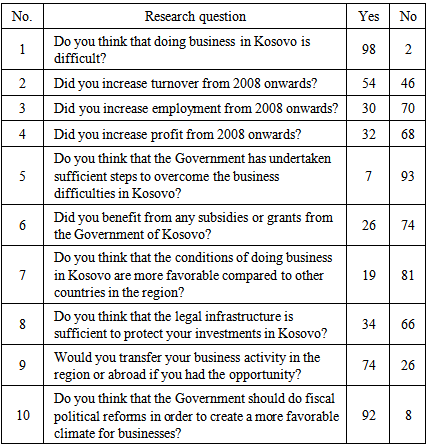-
Paper Information
- Next Paper
- Paper Submission
-
Journal Information
- About This Journal
- Editorial Board
- Current Issue
- Archive
- Author Guidelines
- Contact Us
American Journal of Economics
p-ISSN: 2166-4951 e-ISSN: 2166-496X
2015; 5(3): 347-352
doi:10.5923/j.economics.20150503.06
Impact of Economic and Financial Crisis in Kosovo Businesses and Measures Undertaken by the Government
Skender Hasani
University College “Vision for education”, Kosovo
Correspondence to: Skender Hasani, University College “Vision for education”, Kosovo.
| Email: |  |
Copyright © 2015 Scientific & Academic Publishing. All Rights Reserved.
The economy of countries in the Balkans as a whole and Kosovo face greater challenges which requires undertaking substantial reforms in order to increase competitiveness of products of the countries in the Balkans, not only in the Balkan market but in the European and world market as well. Different economic and financial crisis bear great impact in the overall development thus countries with rather sensitive economy, underdeveloped private sector, high degree of informality in the economy, lack of foreign investments and a great number of other weaknesses must be extremely vigilant and focus their capacities to easily and quickly overcome such difficulties and emerge from these cyclic crisis with as little damage as possible to the overall economy and especially domestic businesses. Similar to a large number of places, the economic and financial crisis affected Kosovo businesses that face numerous difficulties such as lack of government fiscal incentives, lack of legal infrastructure for their protection from unforeseen circumstances and situations, disloyal competition, high loan interest rate, inability to utilize professional staff proven throughout the world and some other factors that influenced in Kosovo economy to become highly dependent on the import with little growth of its productivity. Regardless of the reforms Kosovo Government undertook to overcome the economic crisis and endeavours to establish reforms that will allow Kosovo business to breathe, these actions remain flawed with regard to what should have taken place and what the country could do in current conditions where Kosovo business has vital need for comprehensive and advantageous reforms. With this paper we therefore wish to emphasize steps undertaken until now and steps that must be undertaken in the future to create a favorable and competitive environment for Kosovo businesses.
Keywords: Economy, Businesses, Fiscal policies, Competitiveness, Reforms
Cite this paper: Skender Hasani, Impact of Economic and Financial Crisis in Kosovo Businesses and Measures Undertaken by the Government, American Journal of Economics, Vol. 5 No. 3, 2015, pp. 347-352. doi: 10.5923/j.economics.20150503.06.
Article Outline
1. Introduction
- Business and economies of different countries go through various periods of crisis from time to time which affect the overall social development of countries. Given the fact that now the world gone through essential changes as a result of globalization in all walks of life and thus in terms if economy, as wll, where opportunities for transfer of capital from one country to another country are great, then the probability that any drip of a cyclical crisis in a certain place in the world to have an impact on the rest of the world since the result of cooperation between the economies of different countries is quite large. Even Kosovo which is characterized by a fragile economy, without financial markets, with a large trade deficit, even though it cvaqn be said that it was not affected by the effects of occasional crises it still had delays in some sectors as a result of these crises or even as a result of not taking adequate measures in order to attenuate the negative effects that have had an impact on the local economy.It is of great importance to have known or measurable early indicators which point towards the crisis because as early as you can see trends in surface of appearance of any crisis then the opportunities to undertake anti-crisis measures are greater. Therefore we can conclude that in general the crisis is a risk of systemic character that touches and affects the economic activity of all entities that are operational, therefore real analysis and discovery of facts seeks to encourage the businesses, corporations, potential investors, trading and manufacturing companies and all state institutions and different groups of businesses, business associations and chambers of commerce, that the crisis is in some way, a kind of epidemic, which systematically affects everyone, without exception.Normally chances that occasional crises can impact the economic activity of a company or corporation and its impact intensity is different in various corporations but it certainly will affect many businesses. How much would a business corporation be affected by the effects of a crisis depends on a number of factors relating to the sector where a corporation carries on business, depends on the structure of corporate activity, depends on the availability of the corporation to make the adaptation of its activities with other activities, depends on what capital or funding sources it uses to finance its primary activity or changes associated with adaptation of their activity as well as on a number of other factors which may have an impact on the activity of the overall corporation.It is known that Kosovo, as well as other countries of the Balkan region, is characterized by the absence of financial markets such as it is the case in Kosovo or financial markets not too developed as is the case with some other Balkan countries but despite this we cannot say that the Balkan region is a closed region or that Kosovo's economy is a closed economy. Kosovo's economy is characterized by a high degree of imports of goods and services from different countries therefore we can conclude that even though there is a large trade deficit, communication channels of Kosovo’s economy with those of the region, Europe and beyond, are quite numerous. Kosovo's economy as well as the one of different countries of the Balkans is characterized by the small businesses that do not have a stable base for funding periods when crisis (when they appear) situations and their activity is not immune to the crisis.
2. Purpose and the Objectives of the Study
- The purpose of this paper is to examine the steps that have been taken by the Government of Kosovo with the purpose of assisting Kosovar businesses in order to facilitate them to go through the cycle of their business crisis or crises which those businesses may suffer from the influence of external factors since the Kosovar economy is mainly based on imports and therefore the impact of crises from other countries may have an impact on businesses which do business with countries of the region and beyond.Even thoug it was said that the financial crisis of 2008 and subsequent ones have had no impact on the Kosovo economy since Kosovo's economy does not have financial markets and there is no great participation of Kosovo exports to other markets we may still conclude that this crisis and other crises have had and in the future will have an impact on the economy and also in Kosovo businesses.While some of the countries of the region during the crisis were in a recession we are pleased with economic growth of 2-5% which is brought from 2008 to 2013. This growth considering the high rate of unemployment that exists in Kosovo, the high level of poverty, non-competitiveness of local products with those of the region and a number of other constraints do not allow a convenience but require that the government on the one hand to take drastic steps in a number of different economic spheres demanding structural reforms in legislation, other infrastructure and different governmental departments which would t will help businesses to accelerate the recovery of Kosovo which would have chain effect on the Kosovo economy in general. Kosovo government has undertaken several business reforms which made Kosovo to rise in the rankings of place to do business but it has not made other reforms or rather have been deficient in other activities which would enable various businesses to facilitate doing business.Recognition of crisis and evaluation of its effects is related to the fact that often the response should be on the block. Businesses which have difficulties and decline due to the business life cycle, as it is generally the construction sector in our country, have other issues compared to the businesses the activity of which is focused on the food sector, or with businesses that are focused on the tourism sector. However, reaction and protection of the interests should be collective. Very often, people of politics, sometimes even the media, and in some cases the businesses, treat problems of the crisis as disconnected, or as biased. Crises and overcoming them requires a high degree of interaction between the public and private sector. Smart public policies are those that consider private business as their partner. An active private business which develops and grows quickly is a steady and a strong base for a consolidated state budget, and the opposite a business in trouble needs an encouraging climate and public, fiscal and administrative support.Some of the elements that have had an influence in Kosovo businesses have been as follows:First, the significant reduction of household consumption, lack of financial resources in households;Secondly, higher interest rates have had a negative effect in funding businesses;Third, use of remittances mainly for consumption but not for direct investments in economic capacities;Fourth, growth or non-reduction of unemployment;Fifth, allocation of a large portion of the state budget on road infrastructure but not in allocations in manufacturing capacity which would have had an impact on overall economic development;Sixth, the increase of percentage in outstanding loans on time is a parameter that expresses a real concern and it measures the fact that the economy is in trouble.The past four years (2008-2011) have been the most difficult years for the international economy and the European Union, since the global crisis of 1939. The international crisis of recent years has been more emphasized in the EU, since Europe, besides the international financial crisis, was faced with budget deficits crisis of member countries, ranging from Greece, Italy, Ireland, Portugal, Hungary, the Baltic countries etc. But during this period, even though we had to deal with a crisis in these countries, remittances from Kosovars did not decline. With the exception of 2009, when remittances declined symbolically, in other years in Kosovo remittances have increased steadily and they brought over 500 million euros a year, data confirmed by the Central Bank of Kosovo. According to the Central Bank of Kosovo, Kosovo remittances have continued to grow by 1.2% in the first half of 2011. Even in 2010 remittances in Kosovo increased by 1.3%.These and a number of other factors are also determining factors of the ability of Kosovo businesses to make business and some of these factors are factors on which the government has not been able to affect such as the e amount of remittances but could have had an impact on channeling them in good investments and not in the consumption which is mainly made from imported goods.The government does not open new jobs but creates the possibility for their opening in this case the unemployment rate will decrease and the reduction of poverty and other chain effects on local businesses as well. Channeling budget in several major infrastructures projects but not in projects that would affect the growth of productive capacity of Kosovo businesses and the reduction of the dependence of imported products are some of the elements which should have been and should be urgently taken by relevant state institutions. Kosovo has a high potential for agricultural production and for building processing capacities of these products which would enable not only the reduction of the import of these products but also the employment growth of a large number of people including those in the agricultural and industrial capacity.So far, some of the steps that have been undertaken by government institutions are:1. Subsidy of several activities with an emphasis on agriculture;2. Facilitating and accelerating the procedures for business registration;3. Facilitation of some customs procedures;4. The guarantee of deposits to 2000 Euros;5. Reducing the tax on business income.But the undertaking of these steps did not have the expected impact because Kosovo manufacturers and Kosovo businesses are still faring numerous difficulties which have played a decisive role that although there have been some actions and reforms of government institutions they still have not played the effect which is intended by the government.If we analyze only the effects of the reforms outlined above we can conclude that those steps shave not been sufficient and have been deficient since we are in a situation where:1. The level of subsidy for agricultural activities has not created conditions for local products to be competitive against those imported neither in terms of price nor quality.2. Facilitation of business registration procedures was not followed by other facilities in obtaining other necessary permits to develop the activity for which they have invested their capital.3. Facilitation of customs procedures has failed to stop the informal economy which developed mainly from import goods since the import export ratio today is 88/12.4. Although the guaranteed deposits are up to 2000 we still have the highest rates of interest in the region and beyond and it directly affects the difficulty of financing various projects by businesses in Kosovo.5. Reduction of taxes on corporate income from 20% in 2009 to 10% is not accompanied by the combat of informal economy the rate of which, according to statistics of different institutions of the economy, ranges from 28-33% from the gross general product which for 2013 was EUR 5,800,000.00 in Kosovo. Kosovo, despite these measures taken by the Government, still faces the highest level of imports compared to exports which indicates additional commitments are required in order to stimulate domestic production.
|
|
|
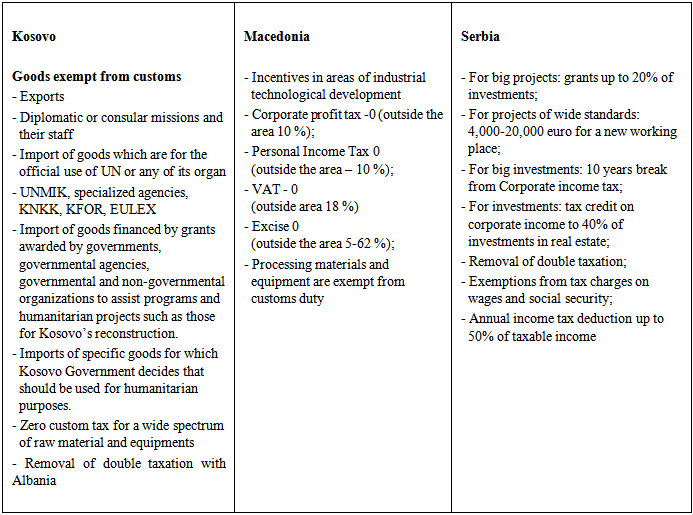
3. Research Question - Methodology of Treatment
- The purpose of this paper is to review what actual steps have been undertaken by the state institutions so that the economics in general and businesses in particular not to get affected by the different cycles of crises involving businesses but also to help businesses overcome difficulties of their occasional cases as a result of those streams. We are witnesses that as a result of the 2008 financial crisis not only in the US but also in many other European countries despite dealing with a liberal economy the state still had to intervene in the banking system either financially assisting many major banks with the aim of saving them from bankruptcy or to intervene in the creation of such legislation in order that such situations are not repeated in the future.Based on this relevant Kosovar institutions have tended to undertake a number of actual steps that would create a favorable climate for business, to arrange for Kosovar businesses to be equal to the conditions of doing business offered to businesses in other countries, however based on the responses received from a number of Kosovo businesses we can say that the businesses are not satisfied with the steps which were taken by institutions due to the obstacles that arise in their business either because of shortcomings in legislation or due to failure to legislation by the authorities.With the aim of analyzing these steps which were taken by relevant institutions and analyzing the situation of doing business in Kosovo we have prepared a questionnaire and sent it to a significant number of Kosovar businesses from whom we asked to answer a number of questions which we deemed relevant and which can give a clearer picture of their situation and their perception of the steps taken by the government. Of the total number of over 10,000 businesses registered in Prishtina region and which develop business (information obtained from the Tax Administration of Kosovo) we analyzed the information returned by 100 businesses of different activities that have been answered and their perception on doing business, their difficulties and other elements that accompany their daily activities.
4. Analyses – Interpretation of Data
- In order to accomplish this paper we have interviewed 100 businesses in various activities mainly from Pristina because it is also the largest economic center of Kosovo where we have submitted sever questions to business leaders in which they have responded mainly with Yes or No.
|
5. Conclusions - Recommendations
- From data obtained as from the interviews conducted with a large number of businesses or even obtained from the relevant local and international institutions operating in Kosovo, it can be concluded that the steps which were taken by the relevant state institutions were not sufficient to establish a stable climate of doing business in Kosovo and therefore this situation has had an impact in businesses having significant difficulties and it has led to having businesses, a part of them, cease their activities, another part of them transferring their activities in other countries of the region and a part of them working with various difficulties, which may affect them in the future to have the fate of some businesses that have closed or transferred their capital abroad.Therefore based on the above we can conclude that it is quite necessary to undertake some substantial reforms with the aim of creating equal conditions, for businesses that develop activities in Kosovo, to those from the region and beyond, those steps are:1. Thorough structural reform by the relevant institution – reduction of bureaucratic procedures for obtaining various licenses; 2. Fighting informal economy and corruption; 3. Creating infrastructure conditions not only in the road but power supply, water and other elements which are necessary for the creation of a stability for businesses operating in Kosovo;4. Use of intellectual capacity and experience from various areas of business;5. Creating the conditions for foreign direct investment.
Notes
- 1. Statistical Office of Kosovo. (2014). Economic Statistics Gross domestic product in the expenditure approach (2008-2013) ', Pristina.2. International Monetary Fond (,2013) Republic of Kosovo several selected issues, Strategy for cooperation on USAID for the development of the country of Kosovo 2014 -2018.
 Abstract
Abstract Reference
Reference Full-Text PDF
Full-Text PDF Full-text HTML
Full-text HTML